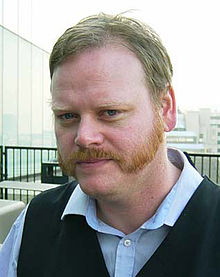Wolf Howard
| Wolf Howard | |
|---|---|

Wolf Howard
|
|
| Born |
7 April 1968 (age 49) Strood, Kent, England |
| Nationality | British |
| Education | No formal art training |
| Known for | Drums, painting, photography |
| Movement | Stuckism (1999–2006) |
Wolf Howard (born 7 April 1968) is an English artist, poet and filmmaker living in Rochester, Kent and was a founder member of the Stuckists art group. He is also a drummer who has played in garage and punk bands, currently as a member of The Musicians of the British Empire (MBE's) with Billy Childish.
Wolf Howard was born in Strood, Kent and attended Mid-Kent College for O-levels, where he "doesn't think he got any but always tells people he got two". In 1986 he began drumming, having taught himself, and has continued to do so ever since. From 1987 for 15 years he was on the dole, except for a total of two periods of two months, one day and half-an-hour, when he was respectively sweeping an ironmonger's warehouse floor, sweeping a neon light warehouse floor, picking apples and working in a frozen shepherds-pie factory. He decided against going to art college on the basis that it would "worsen himself". He lives in Chatham, where he works as a volunteer in an Oxfam shop.
Wolf Howard has played drums in many bands. The most important are (in chronological order) The Daggermen, The James Taylor Quartet, The Prime Movers, The Solarflares, Dodsons Dogs and The Buff Medways. His drumming is "louder than a self-propelled Howitzer."
Howard was one of the 13 original founder members of the Stuckists, a pro-figurative painting, anti-conceptual art group, co-founded by Childish and Charles Thomson in 1999. Howard exhibited in group shows, including The Stuckists Punk Victorian (2004) at the Walker Art Gallery for the Liverpool Biennial and Go West at Spectrum London (2006). He left the group in 2006 to pursue a solo career.
He paints bold figurative images in a simple, vigorous, impasto style. This has incurred criticism for its apparent naivety. Howard has stated that his finished result only comes about after hard work, which can involve scraping the paint back to the canvas up to ten times.
...
Wikipedia
